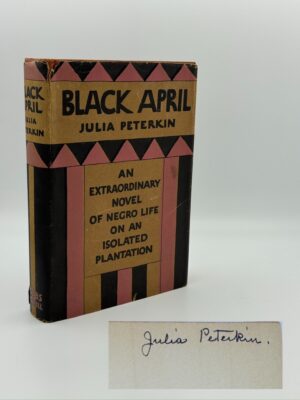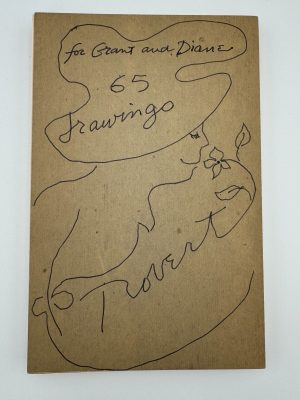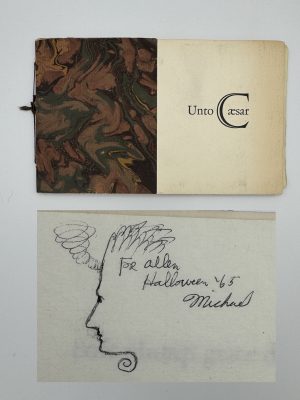Bookfever.com
Membership(s): IOBA, ESA, CALIBA

Michael X born Michael de Freitas, aka Michael Abdul Malik and Abdul Malik (1933-1975)
HOLOGRAPHIC LETTER FROM A BLACK POWER ACTIVIST
$850.00
Michael X born Michael de Freitas, aka Michael Abdul Malik and Abdul Malik (1933-1975)
Single sheet with a handwritten note by this Trinidian-born Black activist, written on one side only, addressed to “Sister” and signed with his usual “Peace and Love.” Undated but the address at the top is 101 Holloway Road, the site of the “Black House,” a commune of which he was the self-appointed leader which was founded in 1969. That was also the year that the Cleavers arrived in Algeria. Michael X described the Black House as a place where “that ‘get a gun’ rhetoric is over. We’re talking of really building things in the community needed by people in the community. We’re keeping a sane approach” although it was later the site of an attempted extortion, for which Michael and four of his colleagues were arrested – and bailed out by John Lennon. This note, which comments that the bearer works for an Australian underground magazine called Oz, co-founded and edited by Richard Neville, reveals how related the various movements of the late 60s were – from the Black Panthers in exile, to Richard Neville’s controversial publishing venture, to John and Yoko Lennon contributing to a fund-raiser for the Black House. Seen in the light of his last years when Michael X returned to Trinidad, where he was tried and convicted and sentenced to death for his involvement in the murders of two members of the commune he founded there (a story told by Nobel Laureate V.S. Naipaul in ‘Killings in Trinidad”), closing with ‘Peace and Love’ seems ironic. Sheet measures approximately 12 1/2 in by 8 inches.
Related products
-
Peterkin, Julia
Black April
$800.00Bobbs Merrill: Indianapolis, 1927. First edition, first issue with ‘ducks quacked’ on page 17 (Ahearn Collected Books). “An extraordinary novel of Negro life on an isolated plantation” signed by the author on front free endpaper. Black April was “accepted by the critics as being one of the best books ever written about the southern negro” (The Sunday Oregonian). A very good copy, gilt on spine and front cover dulled as usual in very good, first issue dust wrapper without Crawford blurb, price intact, extremities of spine a little chipped, one small edge tear to rear. Peterkin went on to win the Pulitzer Prize in 1929, the first southern novelist to receive that honor. A household name for the better part of three decades, “Peterkin’s accomplishment lay in her upending the traditional plantation novel by replacing its gross stereotypes with rural black southerners of complexity, stamina, integrity, and courage, while valorizing the African spiritual inheritance as a transcendent force of cultural regeneration. Because no Uncle Toms, Aunt Jemimas or Colonels clad in white linen inhabited Peterkin’s fiction (indeed, white characters made rare appearances), and because she dared depict tender love and sex between black people, prickly white southerners viewed her suspiciously, perceiving her work as inflammatory and pornographic. In a letter to her mentor H.L. Mencken, Peterkin admitted the sting of her own family’s disdain. Her grown son, she relayed, urged her to write about ‘beautiful white men and women, not n-words.’ In a poignant confession of her alienation she tersely wrote, ‘No beautiful white people live in my head.'” (Life out of Darkness: The Recovery of Julia Peterkin, Forgotten Pulitzer Prize Winner by Elizabeth Robeson, M.Phil, Columbia University). less
moreOffered for Sale by: The Accidental Bookseller -
Duncan, Robert
A Selection of 65 Drawings from one drawing book 1952-1956
$400.00Black Sparrow Press: Los Angeles, 1970. 65 loose prints, not bound (as issued). A signed presentation copy from Duncan to Diane di Prima and her second husband Grant (Fisher), with a full page original drawing on card stock, measuring 6″ X 9″, in the style of drawings from the book. The Black Sparrow Press item appeared with a publisher’s chemise and signed colophon page — these are not present here and presumably weren’t included in the author’s copies of the book. A few minor age spots to card stock, otherwise fine. When speaking of the impact of Duncan’s teachings, di Prima cited the lesson that poetry intensifies life. In an interview with fellow Beat poet David Meltzer, she recalled, “Robert was probably one of the closest, most intimate lovers I ever had, even though we never had a physical relationship. I learned a lot of different kinds of things from him. One of the things I learned—in a way no teacher of Buddhism ever showed me—was how precious my life was. How precious the whole ambience of the time. A real sense of appreciating every minute.” di Prima recalled their personal relationship in an August 2001 interview with poet David Hadbawnik: “Robert used to come and hang for days, he’d move into my house in Marshall in the ’70s, and bring his French mysteries that he was teaching himself idiomatic French from, and his notebook, and he’d stay for days. And he always came to Christmases with the kids, because Jess doesn’t like holidays, and so I’d have to say mid-’70s, through ’75 on, he was there many weekends, many mornings…. Eating fried herring from the bay for breakfast.” less
moreOffered for Sale by: The Accidental Bookseller -
McClure, Michael
Unto Caesar
$450.00(San Francisco): (Dave Haselwood), (1965). A non-commercial publication, with most copies given away to friends of the author and printer. Hand-sewn in printed wrappers, 6.5″ x 4″, 24 pages, circa 60 copies. The first publication from Dave Haselwood after he left Auerhahn Press in the hands of his partner, Andrew Hoyem. This copy inscribed “For Allen”, signed “Michael”, and dated Halloween, 1965. Additionally, McClure has added a self-portrait drawing. Although not definitively established, it seems likely that the recipient is Allen Ginsberg. Ginsberg and McClure both lived in San Francisco at the time, and the famous photograph of them with Bob Dylan and Robbie Robertson in the alley behind City Lights Books was taken shortly after the date of the inscription. A very good copy, front wrap unevenly and lightly tanned, rear wrap with one light crease, spine a little rubbed, some interior pages don’t quite align to wraps (potentially as issued). less
moreOffered for Sale by: The Accidental Bookseller

 USD
USD GBP
GBP EUR
EUR CAD
CAD AUD
AUD ZAR
ZAR

